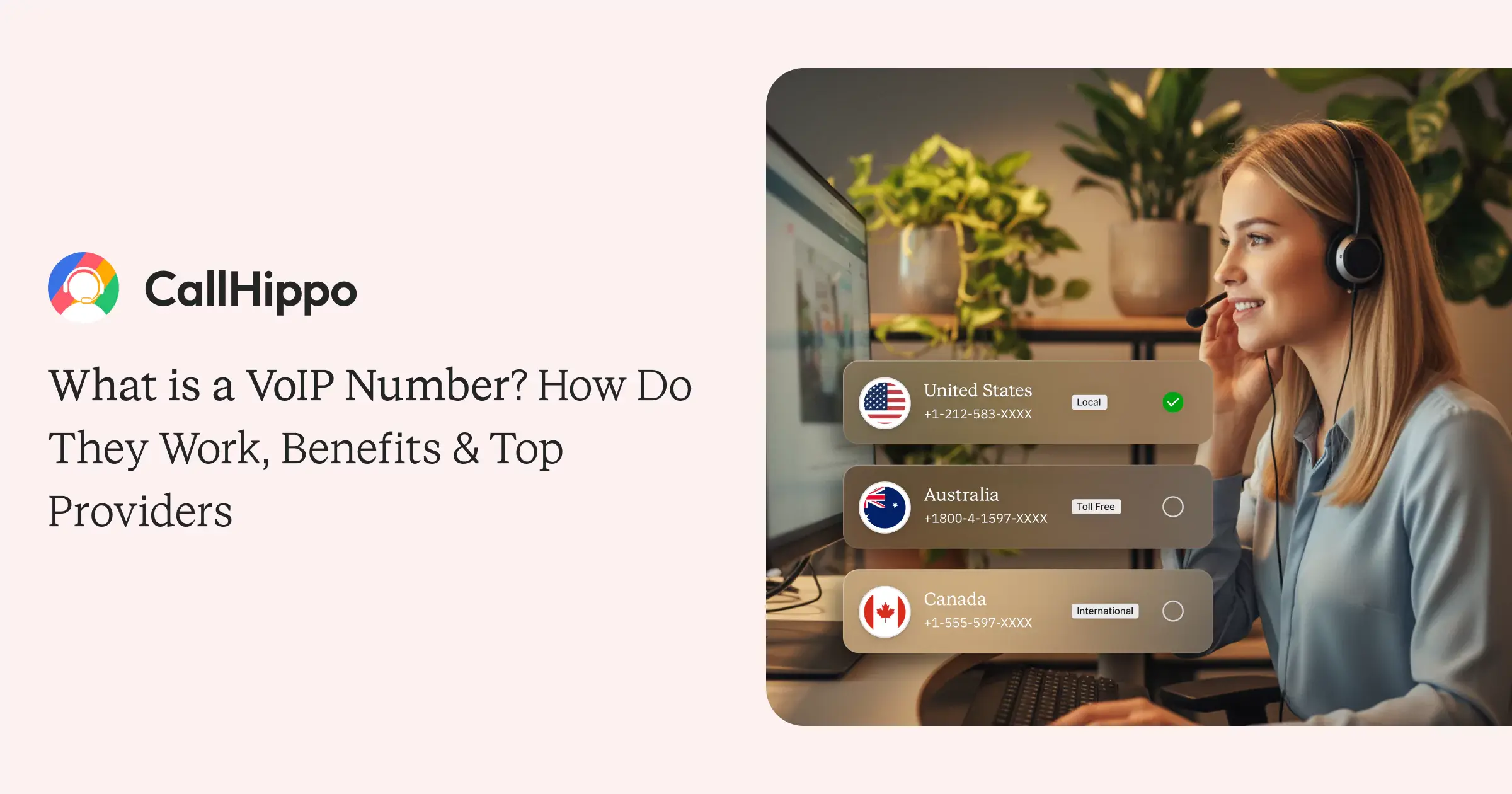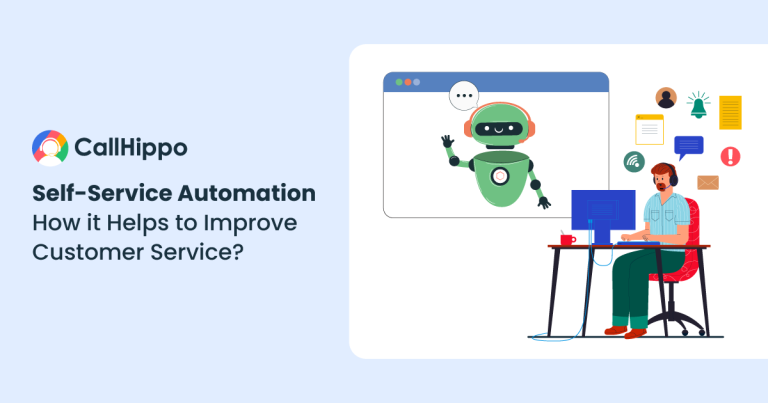

Updated : October 7, 2025
A VoIP number is a phone number that works over the internet instead of the public switched telephone network. You can use it to make and receive calls on your mobile device, laptop, or desk phone. This makes VoIP phone numbers a good fit for businesses that want affordable and flexible business communications.
VoIP technology turns voice calls into digital data that travels online. 90% of businesses will adopt a hybrid cloud approach through 2027. You get useful features like call forwarding, voicemail-to-email, video conferencing, and call recording.
What is a VoIP Number?
A VoIP phone number is basically a phone number that runs on the internet rather than traditional phone lines. VoIP stands for Voice over Internet Protocol. It uses your internet connection to send voice data.
You can make and receive calls just like any regular phone number. The difference is that it’s not stuck to one physical location or traditional landline. You can use it on different devices, your mobile phone, computer, or IP phone.
What is the Difference Between VoIP Numbers and Traditional Phone Numbers?
VoIP numbers run on the internet. Traditional phone numbers use the public switched telephone network. They’re different in how they work, what they cost, and how flexible they are.
| Aspect | VoIP Numbers | Traditional Phone Numbers |
|---|---|---|
| Technology | Sends voice calls as digital data over the internet. | Uses traditional phone lines and old circuit-switching tech from phone companies. |
| Devices Supported | Works on mobile devices, laptops, VoIP phones, and computers. | Only works with traditional landlines and cell phones. |
| Flexibility | You can use it anywhere you have internet service. | Stuck to one physical location or SIM card. |
| Cost | Usually cheaper, especially for international calling. | Costs more, particularly for long-distance calls and toll-free numbers. |
| Features | Has call forwarding, voicemail-to-email, video conferencing, call recording, and an auto attendant. | Just basic calling and SMS with not many advanced features. |
| Scalability | Easy to add or drop business phone numbers when needed. | Adding lines means more hardware and costs. |
How Does a VoIP Phone Number Work?
A VoIP phone number converts your voice into digital signals that travel over the internet instead of the public switched telephone network. When you talk into a device that supports VoIP, your voice gets changed into data packets. The VoIP network pushes these packets through the internet to whoever you’re calling.
Since VoIP relies on the internet, you can use it on different devices. Your mobile phone, laptop, tablet, or IP phone all work. This means you can make and receive calls from pretty much anywhere with a reliable internet connection. Besides good call quality, VoIP systems cost less than what traditional phone companies charge.
What is a VoIP Phone Number Used For?
A VoIP phone number handles flexible and affordable business communications for work, personal use, and international needs with practical features.
Business Communication & Customer Support
Businesses use VoIP phone numbers to handle incoming calls, support tickets, and sales questions. Features like call forwarding, auto attendant, and voicemail-to-email help customers reach the right person without hassle. Call recording is good for quality assurance and training.
Personal Calls and Remote Work
VoIP numbers make personal calls straightforward. You can take phone calls on mobile devices, laptops, or tablets. For people working remotely, you get one business phone number that works everywhere. This keeps team messaging and collaboration with clients smooth. Your customer support stays consistent whether you’re at home, at a coworking space, or traveling to another country.
International Calling at Lower Rates
VoIP phone numbers save you real money on international calling versus what traditional phone companies charge. You can make long-distance calls to clients, friends, or family overseas without spending too much. VoIP also opens up new revenue opportunities. 60% of smartphone users have called a business directly using the “Click to Call” button in a Google search, a feature easily managed with VoIP numbers.
Pro-Tip
Always enable E911 to make sure emergency calls route correctly, especially for remote teams
Use end-to-end encryption to secure your VoIP calls and sensitive business data.
Virtual Local Presence with Global Numbers
VoIP providers let businesses get a voip number that creates a local presence in different countries. Say you’re a U.S. company, you can have UK or Australian business numbers. When customers call, it feels like they’re calling someone local. Toll-free voip numbers help with trust, too. This increases engagement and makes expanding to international markets easier without actually having physical locations there.
Benefits of Using VoIP Numbers
VoIP phone systems give businesses and regular people affordable and flexible ways to communicate. They help with connectivity, scaling up, and working more efficiently with useful features.
Cost Savings on Local & International Calls
VoIP numbers cut your call costs way down compared to traditional landlines. Businesses save on international calling and long-distance calls. Regular people get affordable local and global communication. You don’t get hit with hidden charges or crazy monthly bills from traditional phone companies.
Flexibility Across Devices
VoIP phone numbers work well on mobile devices, laptops, and desk phones. You can make and receive calls from basically anywhere. Business communications stay smooth whether you’re working remotely, traveling, or switching between multiple phones. Mobile apps let you access your existing phone numbers when you’re out and about.
Advanced Features
VoIP systems come with practical business tools like call forwarding, voicemail-to-email, and auto attendant. Call recording helps with quality assurance. Video conferencing lets you meet face-to-face without being in the same room. SMS messaging keeps your team connected. These features help you work better, make customer interactions smoother, and give you an edge over traditional phone systems.
Easy Scalability for Growing Teams
Adding new business phone numbers or dropping ones you don’t use is simple with VoIP service providers. Small businesses can scale communication up or down as teams grow. You don’t need expensive installations or extra hardware from traditional phone companies. You can keep your existing business number while getting reliable and good-quality connectivity.
Integration with CRMs & Business Tools
VoIP phone systems connect with CRMs and business apps. This makes workflows smoother and team messaging better. You can manage customer interactions, keep track of phone calls, and work more efficiently. Everything, your communication and essential business tools, lives in one virtual phone system.
Simplify Your Calls and Voicemails Today !
Try CallHippo and manage all your team’s calls, voicemails, and messages from one simple dashboard
Potential Limitations of VoIP Phone Numbers
VoIP numbers offer flexibility and save money, but there are some real limitations. These have to do with call quality, getting help in emergencies, and keeping things secure.
Call Quality Dependence on the Internet
VoIP call quality depends heavily on having a stable internet connection from your internet service provider. If your bandwidth is poor, you have lots of network traffic, or the internet goes out, you might get dropped calls. There can be delays or the sound quality drops. How reliable your internet is really matters. A reliable internet connection keeps voice calls and customer support running smoothly.
Emergency Calling Limitations
Unlike traditional landlines, VoIP numbers don’t always connect straight to emergency services. Tracking where you are at your physical location can be off, too. This makes VoIP less dependable in emergencies. Pick VoIP providers that have enhanced 911 (E911) services so calls route properly when you really need help.
Security & Privacy Concerns
VoIP calls can be hit by cyber threats like VoIP fraud, VoIP phishing, people listening in on calls, and hacking. If your provider doesn’t have strong encryption and security in place, the risks go up. Small businesses need to go with trusted VoIP service providers. Follow good safety practices to protect sensitive customer interactions and business communications.
How to Get a VoIP Number?
Getting a VoIP phone number means picking a VoIP provider, choosing what plan works for you, and setting up your business phone system.
1. Choosing a VoIP Provider
- Look at pricing plans and what advanced features different VoIP service providers offer.
- Check if the provider is reliable by looking at uptime promises and whether their customer support team is available.
- Make sure they have options for scaling so your business phone system can grow later.
- The provider should have good security to stop VoIP fraud and keep your business communications safe.
2. Free vs Paid VoIP Numbers
- Free VoIP numbers don’t have many features, and the call quality isn’t great.
- Paid business phone numbers give you advanced features and work more reliably for businesses.
- Free versions might show ads, which look unprofessional and mess with customer interactions.
- Paid VoIP phone numbers come with customer support and security that’s good enough for business use.
3. Steps to Set Up a VoIP Phone Number
- Sign up with the VoIP service provider you picked.
- Pick a phone number based on where you are. You can choose from local numbers, international numbers, or toll-free numbers.
- Set up your device settings using mobile apps, software, or desk phones.
- Test everything to make sure call quality is good and you can handle incoming calls properly.
Best VoIP Number Providers in 2025
VoIP providers have different features, pricing, and how flexibility they are. What’s right for you depends on what your business phone system needs and what you can spend.
CallHippo
CallHippo is a well-known VoIP service provider built for small businesses of different sizes. Setup is easy, you get useful features, and it works globally. The pricing is fair, and the dashboards are simple to use. CallHippo keeps business communications running smoothly for sales teams, customer support, and remote workers everywhere.
Key Features
- Call Forwarding
- Power Dialer
- Call Recording
- IVR System
- Analytics Dashboard
Pros
- Setup doesn’t require technical knowledge, so you can get a VoIP number without hassle.
- International calling is affordable, which helps businesses spend less on communication.
- Works with CRMs to make workflows smoother, which helps with team messaging and customer interactions.
Cons
- Doesn’t work offline without a reliable internet connection.
- Features like call recording require you to upgrade to more expensive plans.
- Call quality can vary in places where internet service is weak.
Pricing
Offers a free trial, starts at $18 per user per monthly.
Activate Your Business VoIP Number
Get started with CallHippo today, set up your business number in minutes, and streamline team communication
Nextiva
Nextiva is a top VoIP solution that’s reliable and has good business communications tools. You get unified communication features, strong analytics, and their customer support team works 24/7. It’s built for bigger companies. Nextiva helps businesses run operations smoothly, improve team messaging, and manage phone calls well across multiple devices.
Key Features
- Auto Attendant
- Call Routing
- Video Conferencing
- Voicemail to Email
- Team Messaging
Pros
- Uptime is excellent, so businesses get reliable phone calls without constant interruptions.
- Their customer support team is there 24/7 and fixes technical problems quickly.
- Unified communication includes video conferencing and an auto attendant, which helps workflows.
Cons
- Plans cost more than what smaller VoIP service providers charge.
- Some analytics features are complicated if you’re just starting out.
- International calling rates might be higher than budget VoIP providers.
Pricing
Starts at $25 per user monthly.
Vonage
Vonage has been around a while and global businesses trust it for solid business tools. They offer solutions that scale, call quality is reliable, and features can be customized. Vonage integrates with lots of things. Companies use it for managing customer interactions while staying flexible across different industries.
Key Features
- Call Queues
- Virtual Receptionist
- Call Monitoring
- CRM Integrations
- Call Recording
Pros
- Solutions scale well, so both startups and big companies can use it.
- Connects with popular CRMs to make customer support easier and track incoming calls.
- Call quality is reliable for clear and professional voice calls.
Cons
- Setup can feel confusing if you don’t have technical knowledge.
- Features like call recording need more expensive plans, which increases what you pay monthly.
- Customer support isn’t always quick to respond when things get busy.
Pricing
Starts at $19.99 per line monthly.
Dialpad
Dialpad is a newer VoIP provider with AI-powered calling, transcription, and analytics. It’s aimed at remote teams and small businesses that need smart business communications tools. You get mobility, insights in real-time, and it connects with other things easily. Dialpad helps productivity and customer support while keeping voice calls high-quality.
Key Features
Pros
- AI transcription and insights help you work faster and save time.
- Works well on mobile devices, which is great for remote teams.
- Connects strongly with business apps to make workflows and team messaging smoother.
Cons
- VoIP relies on the internet, so call quality can drop when lots of people are using it.
- You need premium plans for AI features, which cost more.
- International calling coverage isn’t as wide as some other VoIP service providers.
Pricing
Starts at $15 per user monthly.
8×8
8×8 gives you enterprise-level VoIP systems with features like video conferencing and analytics. Global businesses use it when they want security, the ability to scale, and unified business communications. 8×8 helps companies spend less money while keeping team messaging strong and connectivity reliable across international locations.
Key Features
- Video Meetings
- Team Chat
- Call Analytics
- Call Recording
- Auto Attendant
Pros
- International calling to many countries is included without paying extra per minute.
- You get a lot built in, video conferencing, auto attendant, call recording, and analytics.
- Connects well with CRMs, helpdesks, and business tools.
Cons
- Pricing isn’t always clear and can get expensive for small businesses.
- Call quality sometimes has issues, and calls get dropped in areas where the internet service is weaker.
- Their customer support team gets mixed reviews; sometimes, they’re slow or don’t respond when things are critical.
Pricing
Starts at $24 per user monthly.
OpenPhone
OpenPhone is made for startups and small businesses that want affordable and simple business phone systems. You get business phone numbers, voicemail, and it connects with Slack and CRMs. The platform is easy to use and priced competitively. OpenPhone makes professional business communications simple for entrepreneurs.
Key Features
- Business Numbers
- Voicemail Transcription
- Shared Inboxes
- Slack Integration
- Call Forwarding
Pros
- Pricing is affordable, which really appeals to startups and small businesses.
- Connects with Slack and CRMs to make tasks simpler and customer interactions better.
- The interface is simple and doesn’t need much training, which is perfect for small business employees.
Cons
- Doesn’t have enterprise-level features that bigger organizations need for scaling.
- Limited international numbers make it harder for businesses planning to expand globally.
- Customer support isn’t enough when you run into technically complicated issues.
Pricing
Starts at $13 per user monthly.
JustCall
JustCall is a VoIP solution for sales and customer support teams. It has automation, call recording, and connects with CRMs to make customer interactions smoother. Businesses use JustCall to work more efficiently, improve workflows, and stay professional across multiple devices and remote teams.
Key Features
Pros
- Automation saves time and makes things more efficient for busy sales teams.
- CRM connections make tracking customer interactions and incoming calls simpler.
- Interface is easy to use, so people can start using it quickly without needing technical knowledge.
Cons
- Advanced analytics are locked behind more expensive plans.
- You can’t make calls offline without a stable internet connection.
- International calling rates are sometimes higher than what other VoIP providers charge.
Pricing
Starts at $19 per user monthly.
GoTo Connect
GoTo Connect is an all-in-one virtual phone system that puts together phone calls, video conferencing, and team messaging. It’s built for growing businesses and gives you reliable uptime, the ability to scale, and professional features. It helps companies save money while keeping business communications organized across different devices and teams that are spread out.
Key Features
- Video Conferencing
- Call Routing
- Voicemail Transcription
- Team Messaging
- Auto Attendant
Pros
- Combines calling, video conferencing, and team messaging in one place.
- Uptime is reliable, so businesses run smoothly without constant technical problems.
- Plans scale, so they work for small startups and bigger companies.
Cons
- Pricing is higher than many budget-friendly VoIP service providers.
- Some features require training, so there’s a learning curve initially.
- International calling options are more limited compared to leading competitors.
Pricing
Starts at $24 per user monthly.
Phone.com
Phone.com is an affordable VoIP solution for startups and small businesses. You get essential features like call forwarding, voicemail, conferencing, and mobile apps. It’s affordable and simple. Phone.com gives you professional business communications without overwhelming small teams with complicated systems.
Key Features
- Call Forwarding
- Voicemail
- Conference Calling
- Auto Attendant
- Mobile App
Pros
- Pricing is affordable, which attracts startups looking for efficient and reliable VoIP phone systems.
- Features are flexible and cover what smaller business setups need for communication.
- Mobile apps mean you can handle business communications anywhere, anytime.
Cons
- Doesn’t have enterprise-level features that larger organizations need when they’re scaling up.
- Fewer integrations compared to modern VoIP service providers.
- Customer support sometimes isn’t enough for complex business needs.
Pricing
Starts at $12.99 per user monthly.
Security Best Practices for VoIP Numbers
Keeping VoIP phone numbers secure is important to stop unauthorized access, VoIP fraud, and cyberattacks. Following good security practices ensures business communications are reliable, safe, and private for businesses and regular people everywhere.
Enable Two-Factor Authentication (2FA)
Two-factor authentication (2FA) adds extra security to VoIP accounts. Even if someone steals passwords, they can’t get into accounts without that second verification step. This protects sensitive data and reduces VoIP fraud and people using accounts without permission.
Businesses should get employees to turn on 2FA across all business tools. You can use SMS messaging codes, authentication apps, or hardware tokens. Making 2FA required adds accountability. It keeps business phone systems secure even when login details get exposed through VoIP phishing or when people use weak passwords.
Use Strong Passwords for VoIP Accounts
Strong and unique passwords are really important for keeping VoIP accounts safe from unauthorized logins. Simple passwords or ones you use on multiple sites are easy targets for brute-force attacks. This puts sensitive customer interactions at risk. You should use at least 12 characters with numbers, symbols, and a mix of upper and lowercase letters.
Restrict Access with Role-Based Permissions
Not everyone needs full access to VoIP phone system features. Limiting access through role-based permissions helps you control who can manage business phone numbers, change settings, or see sensitive data. This reduces risks from unnecessary or unauthorized access inside teams.
Use Encryption for Calls and Data
Encryption protects VoIP calls and data by making it unreadable if attackers try to intercept it. Without encryption, hackers can listen in on voice calls or grab sensitive information. This creates big security risks like VoIP fraud for businesses and regular people.
You should go with VoIP service providers that offer end-to-end encryption for business communications. Companies also need to make sure data that’s stored, like voicemails and call recording files, is encrypted.
VoIP Number Metrics Every Business Should Track
Keeping track of VoIP metrics helps businesses make communication more efficient, spend less money, and give better customer support while making sure teams are doing their best work.
Call Connection and Answer Rates
Call connection rates and answer rates show how well your customer support team handles incoming calls. High rates mean operations are running smoothly. Low numbers point to problems like bad routing, not enough staff, or technical delays. Watching this helps businesses keep phone calls reliable and stops frustrated customers from giving up on calls.
Formula: Call Answer Rates %
- Number of Answer Calls / Total Incoming Calls x 100
Average Call Duration & Talk Time
Average call duration tells you how long agents spend with customers during phone calls. When durations are balanced, it suggests customer support is working well. If numbers are too high or too low, it might mean issues aren’t getting resolved or customer interactions are being rushed.
Formula: Average Call Duration
- Total Talk Time / Number of Call Handled
Missed and Dropped Call Ratio
Missed or dropped calls hurt customer trust and cost you money. This metric shows where your VoIP network reliability, routing, or staff availability is weak. Getting this ratio down improves how you deliver service overall, makes satisfaction better, and helps customers feel valued. They can reach customer support without trying multiple times or waiting too long.
Formula: Missed or Dropped Call Ratio %
- Missed + Dropped Calls / Total Incoming Calls x 100
Cost per Call / Cost per Minute
Measuring cost per call or per minute helps businesses control their budget. When you compare what you’re spending against how many phone calls you’re handling, leaders can spot inefficiencies. You can pick better plans from VoIP service providers and get better returns on what you’re investing in communication. This keeps operating costs in line with growth and customer support goals.
Formula: Cost Per Call
- Total VoIP Costs / Total number of calls
Formula: Cost Per Minute
- Total VoIP Costs / Total Talk Time
First Call Resolution (FCR)
First Call Resolution shows how often customer problems get solved right away. High FCR rates mean fewer repeat incoming calls, better satisfaction, and lower costs. Low scores show gaps in knowledge, training, or how things are done. This tells you where you need better business tools to make customer interactions more efficient, so you can operate better.
Formula: FCR %
- Number of Issue Resoved on First Call/ Total number of calls x 100
Customer Satisfaction Scores (CSAT/NPS)
CSAT and NPS scores measure how happy customers are and whether they’re loyal after talking with your customer support team. These metrics show how well business communications meet what people expect. Tracking them gives you useful feedback. It helps businesses make relationships stronger, improve support strategies, and make VoIP phone systems better at delivering consistently good experiences over time.
Formula: CSAT %
- Number of Satisfied Customers/ Total Survey Responses x 100
Formula: NPS
- % promoters – % Detractors
VoIP Numbers vs Alternatives
VoIP phone numbers are quite different from traditional landlines, cell phones, and virtual numbers. Comparing them helps businesses pick the business phone system that fits best.
VoIP vs. Landline Numbers
| Aspect | VoIP Numbers | Landline Numbers |
|---|---|---|
| Technology | Internet-based, uses digital signals | Works through copper wires and traditional phone lines |
| Flexibility | Works on multiple devices and locations | Stuck to one physical location and a desk phone |
| Cost | Affordable for local and international calling | Higher monthly charges from traditional phone companies, and expensive long-distance calls |
| Features | Call forwarding, voicemail-to-email, call recording, analytics, integrations | Basic calling and voicemail |
VoIP vs. Mobile Numbers
| Aspect | VoIP Numbers | Mobile Numbers |
|---|---|---|
| Technology | Internet-based phone calls using mobile apps or software | Uses cellular network for calling and SMS messaging |
| Flexibility | You can access it on multiple phones from anywhere | Tied to a SIM card and one cell phone |
| Cost | Lower rates for international calling and long-distance calls | Expensive for international calls and roaming charges |
| Features | Works on multiple devices, integrations, call recording, and auto attendant | Voice, SMS messaging, mobile data, and not many advanced features |
VoIP vs. Virtual Phone Numbers
| Aspect | VoIP Numbers | Virtual Phone Numbers |
|---|---|---|
| Technology | Uses the internet to make and receive calls | Forwards incoming calls to your existing landline or mobile phone |
| Flexibility | Full business phone system with advanced features | Just redirects phone calls, doesn’t have independent features |
| Cost | Affordable subscription pricing | Cost varies based on forwarding to landlines or mobile phones |
| Features | Advanced business tools like voicemail-to-email, call recording, analytics, and integrations | Basic call forwarding, no advanced features |
Conclusion
VoIP phone numbers clearly give you more flexibility, cost less, and have better features compared to traditional landlines, cell phones, and basic virtual numbers. Traditional phone lines are stable and mobile phones are convenient, but they don’t scale well and can’t reach globally like VoIP can.
Virtual numbers give you a local presence but can’t match what a real VoIP phone system does for business communications. Getting VoIP numbers gives businesses modern business tools that make customer interactions better, cut communication costs, and support remote workers or global operations.
FAQs
1. Can I use a VoIP number on my mobile?
Yes, you can use a VoIP phone number on your mobile device through mobile apps like CallHippo. This lets you make and receive business phone calls from anywhere. You get flexibility, convenience, and customer support that doesn’t get interrupted just because you’re not at a physical location or desk phone.
2. Are VoIP numbers free?
Some VoIP providers have free VoIP numbers, but they come with limited features. Business-level phone systems usually need paid plans, though. CallHippo has affordable packages with professional features, call recording, and reliable customer support. This gives you reliability and the ability to scale that free options just can’t match. It’s a better fit for small businesses that want to grow.
3. What is an example of a VoIP number?
A VoIP phone number looks like a regular phone number, but it works over the internet. CallHippo offers local numbers and international numbers that show up as normal business phone numbers when people call. This helps businesses have a local presence globally without actually needing physical locations in different countries.
4. Is a VoIP phone number safe?
Yes, VoIP phone numbers are safe when you go with trusted VoIP service providers like CallHippo. They use encryption, secure protocols, and meet compliance standards to protect phone calls and data from VoIP fraud and VoIP phishing. When you follow good practices, businesses can keep business communications safe, making sure security, privacy, and reliability stay strong in every customer interaction.
Published : October 7, 2025

Shaily Aditya, AVP of Sales, has extensive experience leading sales teams and driving revenue in the VoIP and SaaS sectors. He leads revenue growth initiatives by developing scalable playbooks, managing high-impact teams, optimizing pricing strategies, and using AI tools to enhance team productivity and consistently exceed revenue targets.


Let’s Stay in Touch
Subscribe to our newsletter & never miss our latest news and promotions.
![]()
![]() +24K people have already subscribed
+24K people have already subscribed
Source



